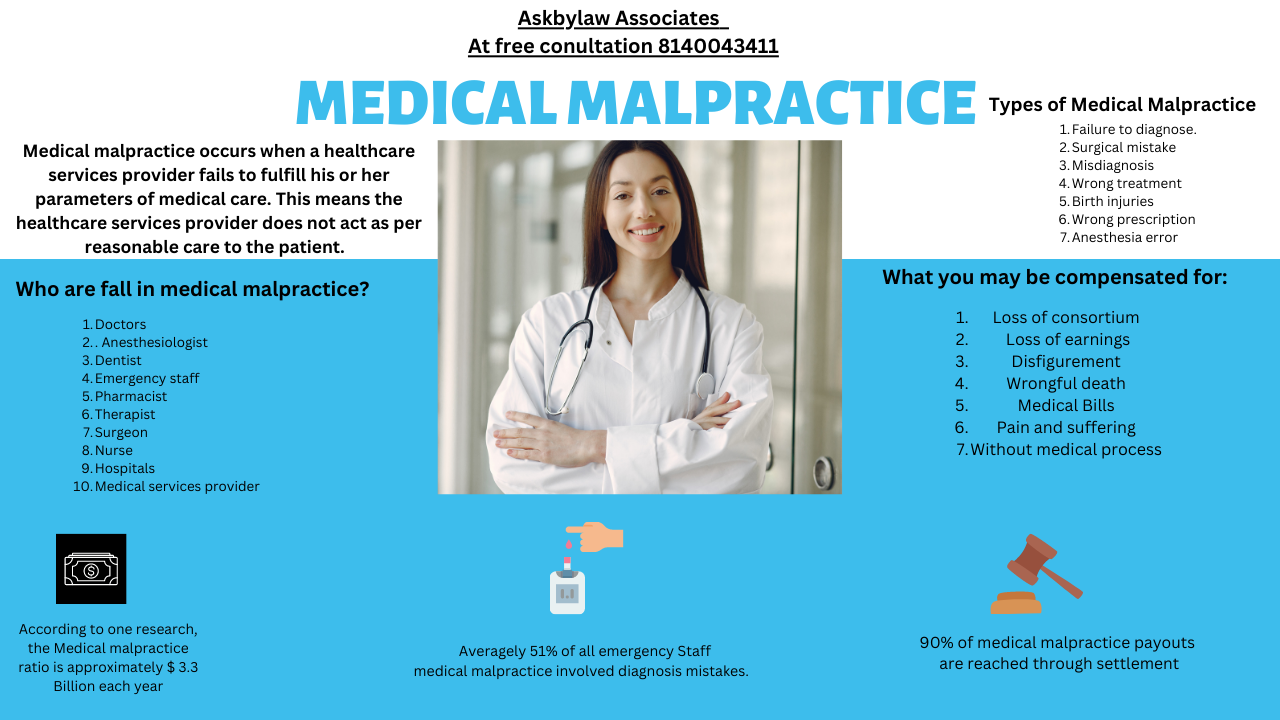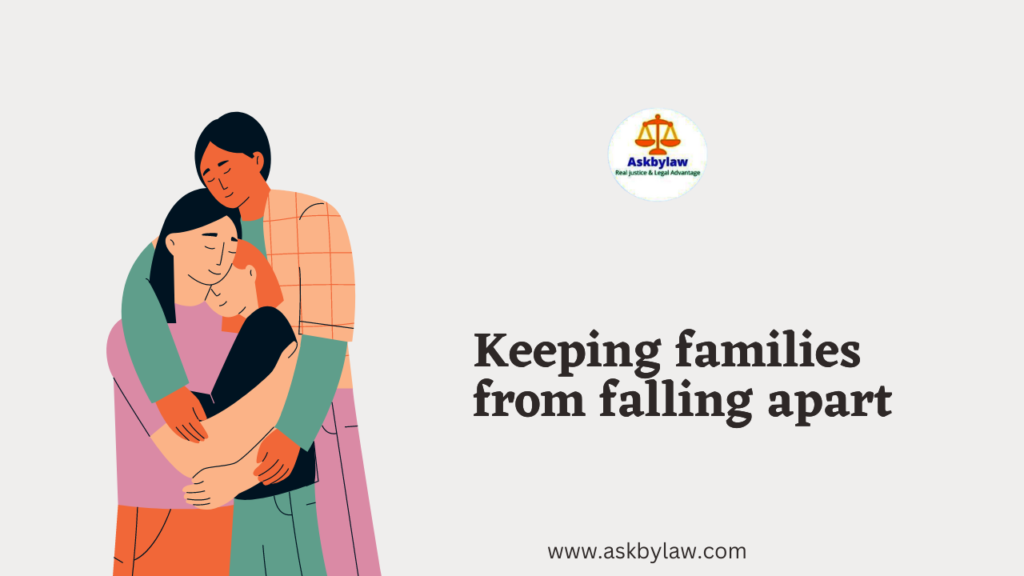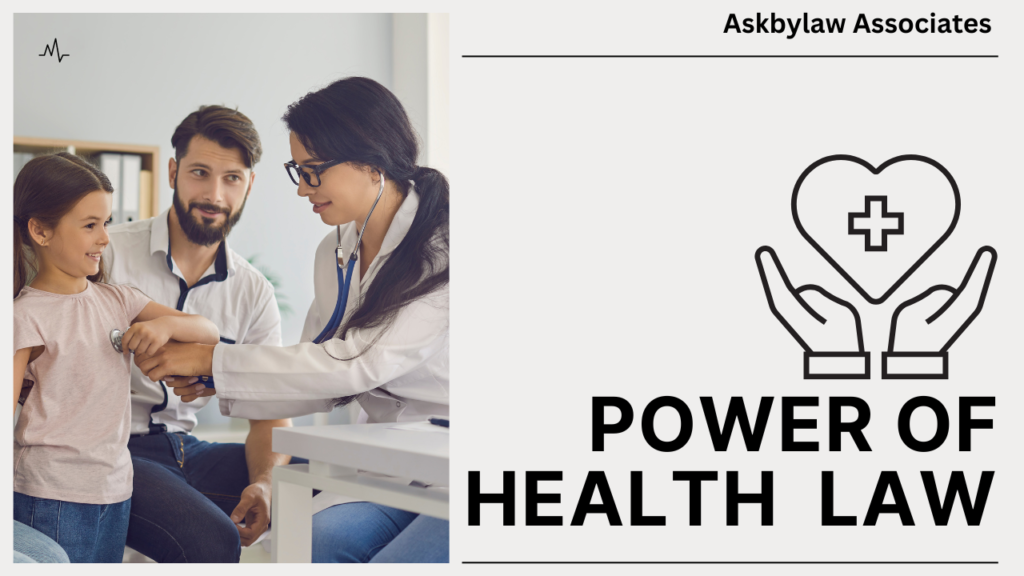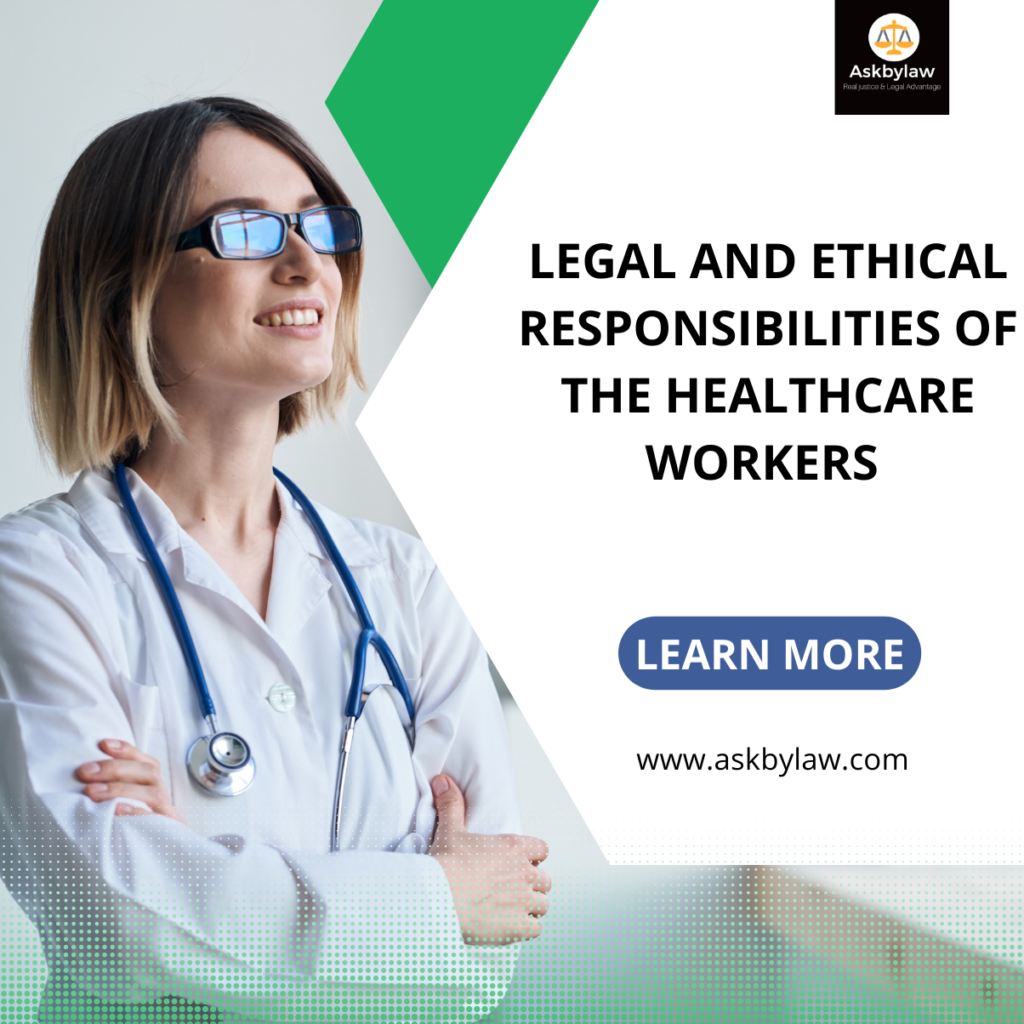


Did you know public health workers have a number of legal and ethical responsibilities? Also, these responsibilities are to protect patients and ensure they receive the best possible care provided by healthcare workers.
Healthcare diligence is one of the most essential and important sectors on the planet. Because it engaged people's lives and well-being, all healthcare professionals are expected to provide patients with safe, effective, ethical care. And they must also follow the Legal and ethical responsibilities of the healthcare workers guidelines. Thus ensuring patient safety and security.
In this blog post, we will discuss with you some of the most of critical Legal and ethical responsibilities of the healthcare workers. I hope you find the said information very useful.

Legal and ethical responsibilities of the healthcare workers
Health law regulations are complex and ever-changing geography. You can ensure that you and any individuals you watch, for, and love, have access to high-quality, nicely priced healthcare by having an introductory understanding of it. The American healthcare system is a massive and delicate network of payers, providers, and controllers. Health laws and regulations play a critical part in icing that this system works effectively and efficiently. Health legislation and laws come in a variety of forms, each serving a distinct function. While colorful laws aim to guarantee that medical professionals deliver high-quality care, others are intended to cover the confidentiality and sequestration of patient information. Still, others are designed to make health insurance more affordable and accessible.
Health laws and regulations can be a challenge to understand, but they're essential forcing that everyone has access to quality, affordable health care. By understanding the basics of health law and regulations, you can help to ensure that you and your loved body are defended
In the said blog post we will give you a comprehensive overview of the most important health law regulations as well as tips on how to act up with them. We will cover patients analogous with the Affordable Care Act and HIPAA and the Americans with Disabilities Act and the Children's Health Insurance Program law. We will also give you awareness to help you find further information and get the help you need it.
Whether you're a business owner, an individual, or the Legal and ethical responsibilities of the healthcare workers the said blog post is for you. Read on to learn further about health laws and regulations and how they can impact you.
| Legal and Ethical liabilities | ||
| Criminal Law | Civil Law | Tort (General tort) |
| Practice without license | Practice without license | Malpractice |
| Theft | Right to informed consent | Misuse of Patient |
| Misuse of Narcotics | Right to access medical records | Physical misuse |
| ETC. | Right to privacy and confidentiality | Psychological misuse |
| Right to refuse Medical treatment | Sexual misuse | |
| Right to quality care | Defamation | |
| Negligence | ||
| Attack of privacy | ||
| Assault and Battery | ||
| Wrongly Admit | ||
Citizen healthcare workers are required to uphold ethical principles. Like beneficence and non-evil and justice. Healthcare beneficence means that healthcare workers must act in the best interests of their patients and provide care that promotes their patient's well-being. Also, non-maleficence means that the Legal and ethical responsibilities of the healthcare workers should avoid harming their patients and justice means that healthcare workers should treat all patients fairly and equally.
The legal and ethical responsibilities of the healthcare workers have a basic duty to provide the best standard of care to patients. This essentially means that they must use their skills and knowledge to provide the best possible care for their patients.
Legal and ethical responsibilities of the healthcare workers have a duty to keep their patient information confidential regarding the patient's health. Basically means that they cannot share the patient's information with any other unauthorized person without the consent of the patient.
Legal and ethical responsibilities of the healthcare workers must respect their patients' right to make their own decision about their care. Basically means that they cannot force a patient to undergo a treatment or procedure that the patient does not want to undergo.
Legal and ethical responsibilities of the healthcare workers have a duty to report any suspected patient abuse to the appropriate authorities. Such as a include physical, sexual, and emotional abuse.

America's healthcare law refers to a body of laws and regulations. This governs the Legal and ethical responsibilities of the healthcare workers industry, including healthcare providers, insurance companies, and patients. This article covers a wide range of legal issues in healthcare laws which are as follows.
America's Health Insurance Portability and Accountability Act set national standards for the privacy and security of protected health information. This HIPAA applies to the Legal and ethical responsibilities of the healthcare workers and providers, health plans, and healthcare clearinghouses that transmit PHI electronically.
In the US. The centers for Medicare and Medicaid Services oversee the Medicare and Medicaid programs. And this provides health insurance coverage for millions of Americans. And all centers for Medicare and Medicaid Services sets standards for the quality of care provided to beneficiaries. It also regulates Legal and ethical responsibilities of the healthcare workers and providers and insurers that participate in these programs.
The FDA regulates the safety and efficacy of medicines, medical bias, and other healthcare products. A, the FDA approves new medicines and bias for use in the United States of America. And monitor the safety of products already available in the market.
The US Stark Law prohibits physicians from making referrals for certain designated health services to organizations in which they have a financial interest. Also, this law is created to prevent financial conflicts of interest in the healthcare industry.
America's anti-kickback laws prohibit healthcare providers from offering or accepting bribes or kickbacks in exchange for patient referrals. The said Act is also created to prevent financial conflicts of interest and ensure that patients receive the best possible care.
USA's ACA is also known as Obamacare. These include provisions regulating the health insurance industry. Similarly, taking individualities to have health insurance and proscribing insurance companies from denying content grounded in pre-existing conditions.
Legal and ethical responsibilities of the healthcare workers and providers in America can be held liable for medical malpractice if they fail to meet the norms of care anticipated in their profession. Performing in detriment or injury to the case.
Legal and ethical responsibilities of the healthcare workers and providers in the US have a legal and ethical obligation to gain informed concurrence from cases before administering any treatment. It also includes furnishing case information about the pitfalls and benefits of treatment options, as well as any options.
US Legal and ethical responsibilities of the healthcare workers and providers must maintain patient confidentiality and protect patient privacy. So cannot share patient information without the patient's consent. Except in cases of it is required by law.
US healthcare legislation regulates health insurance, including the Affordable Care Act (ACA). In which individuals are required to have health insurance. This insurance also provides protection for patients with pre-existing conditions.
America's healthcare law addresses healthcare disparities. And, it seeks to ensure that all individuals have access to quality healthcare regardless of their race, ethnicity gender, or socioeconomic status.
Healthcare legislation in the USA includes provisions to prevent fraud and abuse in the healthcare industry. Such as the False Claims Act, Which imposes penalties on individuals and entities that submit false claims for payment to the government.
In healthcare law in America addresses legal and ethical issues related to end-of-life care. Such as advance directives and the right to die.
Also, healthcare legislation plays an important role in regulating the healthcare industry, and ensuring that patients receive safe and effective care. These healthcare providers, insurance companies, and patients must be aware of healthcare laws and regulations to ensure compliance with their rights and to protect their rights.

Legal and ethical issues are prevalent in healthcare. And Legal and ethical responsibilities of the healthcare workers and providers must be aware of them in order to provide safe and effective care while minimizing legal risks. Here are some common legal and ethical issues in healthcare.
Healthcare service providers have a legal and ethical obligation to gain informed concurrence from the case before administering any treatment. Doing so includes providing patients with information about the risks and benefits of treatment options, as well as any options.
Healthcare service providers must maintain patient confidentiality and cover patient sequestration. In particular, they cannot part take patient information without the case’s concurrence, unless needed to do so by law.
Healthcare providers can be held liable for medical malpractice if they fail to meet the norms of care anticipated in their profession. This results in damage or injury to the patient.
Healthcare providers must navigate complex legal and ethical issues when providing end-of-life care. Because they must ensure that patients receive appropriate care that aligns with their wishes and values.
Healthcare service providers should be aware of healthcare disparities. And work must be done to address it. Therefore, the case or health provider treatment difference may be grounded on race, race, gender, socioeconomic status, and other factors that affect access to care and health issues.
Healthcare service providers may face ethical dilemmas when allocating limited resources. Describe as organs for transplant or during an epidemic when hospitals have limited beds or ventilators. The legal and ethical issues in American healthcare are complex and multifaceted. Also, healthcare providers must navigate these issues to give safe and effective care while maintaining the loftiest norms of professionalism and ethical conduct.

Healthcare workers or health service providers don't only have legal and ethical liabilities, but also ethical liabilities in their profession. Any ethical obligation refers to the duty of healthcare workers to act in the stylish interest of their cases and to do no detriment. One of the main ethical liabilities of healthcare workers is to prioritize the well-being of their cases above their own interests. They must put the requirements of their cases first, indeed if it means making particular offerings. Another ethical responsibility of healthcare providers is to ensure that they give cases with accurate and unbiased information to help them make informed opinions about their healthcare. Alternatives should be handed in. Healthcare providers have an ethical responsibility to admire the autonomy and quality of their cases. Healthcare providers should treat their cases with compassion, empathy, and respect and ensure that they admit care that aligns with their values and beliefs. Healthcare providers have an ethical responsibility to advocate for their cases and ensure they admit the care they need. Healthcare providers should be apprehensive of the social determinants of health that may affect the well-being of their cases and work to address these issues. Or the ethical scores of health care providers taking them to act in the stylish interests of their cases and to admire their autonomy and quality and advocate for their well-being. And by fulfilling these ethical scores, healthcare workers can give compassionate and patient-centered care. That promotes better health issues for everyone.
The above discussion concludes by telling you. The legal and ethical responsibilities of healthcare workers are important to ensure that patients receive safe, effective, and ethical care of the patient. These responsibilities of yours are established by laws, regulations, and ethical guidelines. These rules must be strictly followed by healthcare workers. By following the guidelines, healthcare workers can build trust and establish strong relationships with their patients. This behavior is essential to promote good patient health outcomes.
In addition, healthcare workers are also liable for maintaining the highest standards of professionalism and ethical conduct. Healthcare workers must provide compassionate care to their patients to the respecting their rights and dignity. Healthcare workers need to be knowledgeable, competent, and ethical in their practice.
It is more important than ever for healthcare workers in any country to stay up to date with the latest legal and ethical guidelines and principles. Failure to follow them can increase the risk of legal and ethical issues, harming both patients and healthcare workers while providing the best possible care to their patients.
In short. Healthcare workers are responsible for upholding the highest standards of legal and ethical conduct in their practice. So that they can contribute to a better healthcare system. It can also promote better health outcomes for everyone. And it is imperative that healthcare workers continually educate themselves. And must stay abreast of the latest legal and ethical guidelines and principles to fulfill their responsibilities to their patients and the entire healthcare industry.
If you are healthcare diligent. It is important to stay updated on the latest legal and ethical developments in your field. You can do this by attending health-related continuing education courses, reading professional journals, and networking with other healthcare professionals. You can count on us to help you stay informed and ensure you are providing the best possible care to your patients.
About the Author: Viren Dave is the founder and partner of a law firm called Advocate Askbylaw. He specializes in enhancing engagement and user peace of mind by helping troubleshoot user legal queries. And, starting his career as a lawyer, he supports solving many legal issues in civil, criminal, property, consumer, family, and corporate law. You can find him on his blog or under mentioned social links:



As per the foundations of the Bar Council of Bharat (India), Advocate Viren.S.Dave isn't permissible to solicit work and advertise. By clicking the “Agree” button and accessing this web site (www.asklbylaw.com) the user absolutely accepts that you just Maineasure} seeking info of your own accord and volition which no kind of solicitation has taken place by me.The info provided below this web site is exclusively accessible at your request for information functions solely. It mustn't be understood as soliciting or advert. Advocate Viren.S.Dave isn't accountable for any consequence of any action taken by the user hoping on material / info provided below this web site. In cases wherever the user has any legal problems, he/she altogether cases should obtain freelance legal recommendation.